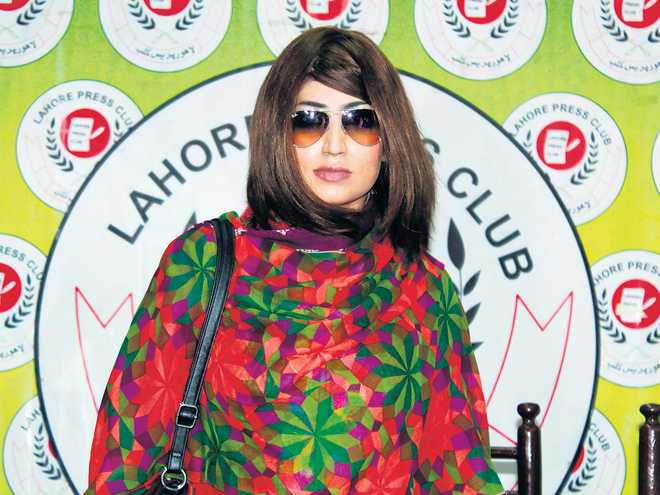
MURDER SHE WROTE: Qandeel paid the price for the hatred of innumerable people who found her videos objectionable and viewed her online presence as a threat to morality
Ratna Raman
THE 21st-century technology has ushered in a quantum change in the densely populated Asian subcontinent. This is evident when watching proliferating virtual lives on social media. Digital technology has made inroads into unequal obscure lives, lived until recently amid swathes of poverty, misery and in the insularity of feudal and clannish cultures.
A couple of years ago, Qandeel Baloch, a young Pakistani woman from a nondescript village in Punjab, became a cult figure on social media for a brief period of time. She posted photographs and comic videos of herself posing, singing, announcing the beginnings of a cold or fever, trying out clothes etc., on Facebook, Twitter and YouTube. Not particularly edifying in a repressive and hypocritical culture, Qandeel’s self-expression possibly replicated the acts of innumerable young women, coming of age in different parts of the subcontinent. In Qandeel’s case, social media made it possible for her to create and use a site of her own, wherein she felt free to express herself uninhibitedly.
Her videos were embraced online by an extraordinary viewership that loved her for her spontaneity. In societies where women still remain second-class citizens and continue to be monitored at every step, Qandeel’s self explorations and self projections on social media provided fantastic and daring routes to imagined and imaginary realms. Her offer to strip for Shahid Afridi, the captain of the Pakistan’s cricket team in the event of a test victory , her adoration of Indian cricket captain Virat Kohli and her subsequent candid conversation with a Maulvi were viewed as risqué and went on to whip up endless media frenzy. Featuring in talk shows, Qandeel’s online appearances excited, galvanised and also titillated her audience.
Although social media provides space for a prolonged exploration of the personal and physical self and promotes a level of heady narcissism, it would be a huge mistake to believe that online sharing of personal information or opinion is safe and unmonitored. Big brothers, real, right-wing or exploitative operate ruthlessly, control access to both real and virtual worlds and continue to maintain the double standard.
Qandeel also drew the ire and hatred of innumerable viewers who found her postings objectionable and viewed her online presence as a threat, corrupting both collective nationalism and individual moralities. In January 2016 she was found dead, allegedly murdered by her younger brother, whom she supported financially. Her parents, beneficiaries of her largesse, testified to their son’s guilt.
Sanam Mehar provides a well-researched narrative, reconstructing successfully the ‘Qandeel Baloch sensation’ on social media platforms and the continuing interest that fed online podcasts worldwide and her tragic death. Qandeel cannot be dismissed as insufficiently highbrow or irrelevant since this would imply a refusal to recognise that aspirational women are propelled by virtual towards what is, in fact, short-lived fame and illusory empowerment. Offscreen, usual patriarchal suspects continue to exercise control, bludgeon women on a whim and deem their preference as both inconsequential and impossible.
Several hapless, harassed women, their suffering exacerbated by net abuse, are also part of the narrative. The pioneering work of Nighat Dad, who founded The Digital Rights Foundation in 2012, is inspirational. Nighat has untiringly worked to provide a vital helpline that assists women victims of cybercrime and makes them aware of their basic rights. Happy stories are few and far and Maher unflinchingly documents the complete powerlessness that is manifest in the private and public lives, led by most women.
Two years and after, Qandeel’s killer is yet to be brought to justice and her aged and ailing parents have now been reduced to a tired soundbyte. Qandeel was funny and quirky and her rejection of the hide-bound identity slotted for all women in hierarchical patriarchal societies was a brave and difficult act. The vicious death meted out to her was unwarranted.
Without exception, women lead lives dominated by cultural taboos, exercise very little rights and continue to be brutalised. Vignettes and exchanges between numerous characters, journalists, ordinary women, university students, police officers, friends and relatives reiterate forcefully that this is no country for women. It will continue to remain unsafe and dangerous, in spite of all the laws and modifications, because rights and redressal for women have very low priority in mainstream ethics, politics and administration. Maher’s disturbing account forces us to steel our nerves, clench our guts and stare into the abyss.



























